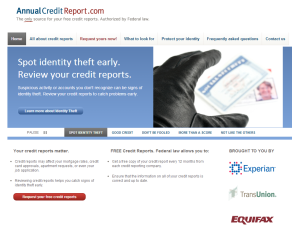Because your credit scores are based on information in your credit report, it is important to make sure that the information in your credit report is accurate. You should review your credit report from each credit reporting repository at least once per year and especially before a large purchase, such as a house or a car.
Most Americans don’t monitor their credit reports at all and the few that do usually pay a service to notify them of any inquiries or recently reported negative activity such as a late payment or a collection account. If you don’t monitor your credit on a proactive basis then you will generally find out about negative items and low credit scores at the worst possible time; when you need financing of some kind and you have no time to fix the error(s) in question. Those that pay a service at least have some advance notice of any negative entries on their credit report, but at what cost.
 The Fair and Accurate Credit Transactions Act of 2003 (FACT ACT) amended the Fair Credit Reporting Act to allow consumers to request and obtain a free credit report once every 12 months from each of the three nationwide credit repositories, Experian, TransUnion, and Equifax. As a result of the FACT ACT, a website with the URL www.annualcreditreport.com was established to make it easy for consumers to request their credit report.
The Fair and Accurate Credit Transactions Act of 2003 (FACT ACT) amended the Fair Credit Reporting Act to allow consumers to request and obtain a free credit report once every 12 months from each of the three nationwide credit repositories, Experian, TransUnion, and Equifax. As a result of the FACT ACT, a website with the URL www.annualcreditreport.com was established to make it easy for consumers to request their credit report.
There are many ways to monitor your credit score, but in my opinion, the best way is to utilize www.annualcreditreport.com. I suggest that you take a quarterly approach to monitoring your credit. For example, in January, go to www.annualcreditreport.com and request a copy of your Experian credit report. In May, request a copy of your TransUnion credit report. In September, request a copy of your Equifax credit report. Then start the process all over again in January.
When you review your credit report, you want to look for the following things:
- Accuracy of your name(s), Social Security number(s), and date(s) of birth
- Discrepancies in your address and employment histories
- Accuracy of the credit limits listed for each revolving credit account
- Accuracy of the payment history reported for each credit account
- Any public records such as a bankruptcy, collection accounts, etc…
- Accuracy of any inquiries into your credit history in the last 12 months
If you discover any inaccuracies you should attempt to get them corrected with the specific credit repository whose report contains the inaccuracies. Not every creditor reports your credit history to all three credit repositories.
This method of monitoring your credit report is a proactive approach and will provide you with the confidence that comes from knowing your credit profile is as accurate and up-to-date as possible, as well as allow you to catch any issues or errors at the time they show up. If you manage your credit profile your credit score will take care of itself.
Another important reason to regularly check your credit report is for early detection of identity theft. Identity theft is when someone uses your personal information, such as your name, Social Security number, credit card number or other identifying information, without your permission, to make purchases, open accounts, take out loans, buy cars, and even get new jobs.
Be wary of services such as www.freecreditreport.com that purport to offer you a free copy of your credit report. They DO NOT, in fact, offer you a free copy of your credit report. Sites like www.freecreditreport.com typically require you to enter a credit card number and subscribe, unknowingly in many cases, to a monthly credit monitoring service that can range from $12.95 to $25.95 per month to obtain your “free” credit report.
Your credit score is something you should manage on a proactive basis. Improving your credit score can help you:
- Get better credit offers
- Lower your interest rates
- Speed up credit approvals
Hopefully, you have a better understanding of what a credit score is. For more information on credit and credit scoring download our FREE report entitled “Credit Scoring and Wealth – The Game of Credit.”
Leave a Comment